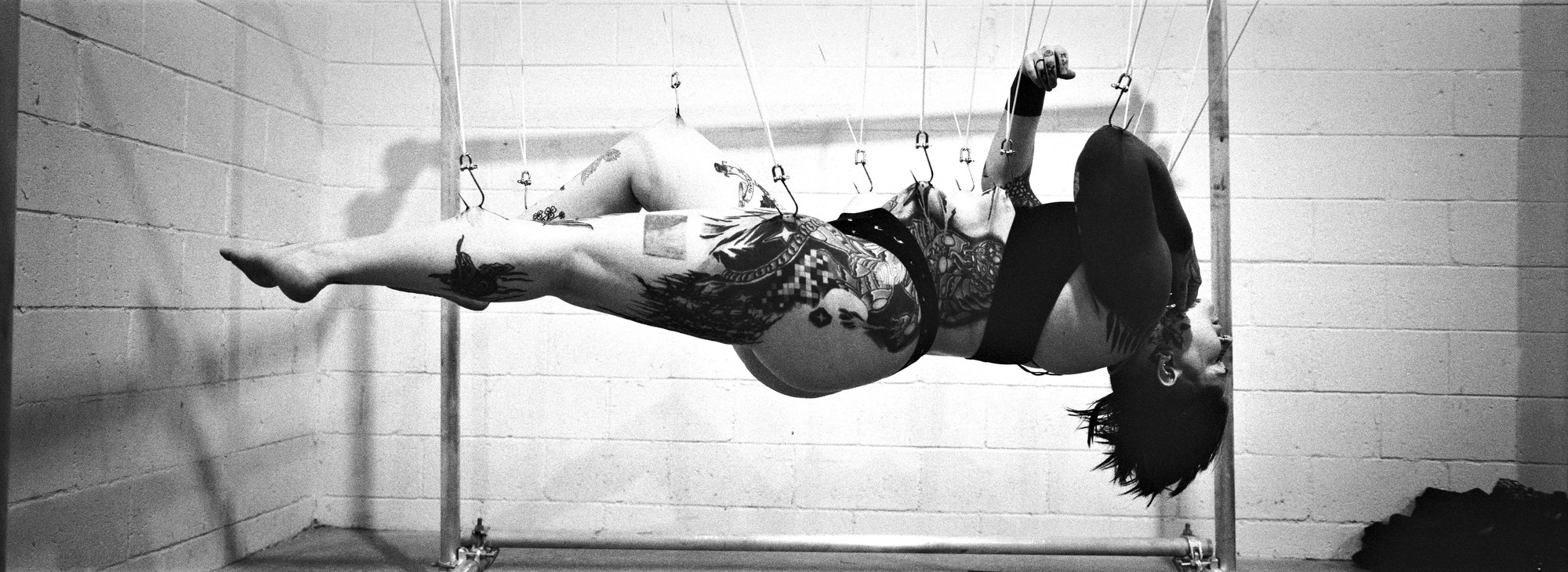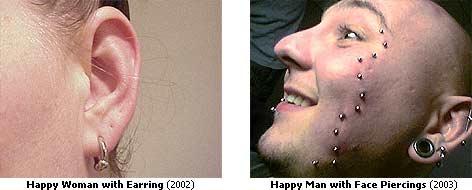
|
"A popular admonition goes 'Don't judge a book by its cover.' Yet we do it all the time. We ascribe qualities of character to people based on their physical characteristics. And our language takes shape to reflect that attitude."– Anu Garg, founder of
wordsmith.org
One of body modification’s core purposes is communication. Humans are of course communicating animals — in some ways the complexity and depth of our methods is our most unique and defining characteristics. So when we permanently inscribe a public message using our bodies, it is the most core and true way in which we can communicate, as we say “I feel so strongly about this that I will become it”.
I don’t think anyone would have any problem agreeing that the way you wear your hair and clothes and so on is a way of communicating who you are to the world. Even if a conscious effort is made “not to succumb to fashion”, that as well broadcasts a message. It’s inescapable. By looking a certain way we invite contact from some people, and also send a “stay away” message to others as we give them a brief but powerful visual introduction to who we are. Every culture in history has ascribed uniforms of style and appearance to themselves as a whole, to their subgroups and castes, and then of course to the individual.
It is impossible to escape this conversation without withdrawing totally from in-person human interaction. Humans are designed for content-rich multi-media communication — to illustrate, think how different it is when you read a movie script versus actually seeing it, where you can watch the way a person presents themselves, how they move, their tone, and so on. Everything we can observe, we interpret.
So when we modify our bodies in a way that’s visible to the public, we are communicating. Like it or not, we are sending a message. It is unavoidable.
The interesting thing about transmitting a message with body modification is that it’s a message that will almost certainly be misinterpreted; how can an unmodified mainstream be expected to understand something that’s totally alien to them? But maybe it’s like abstract art: a subconscious way of communicating? Body modification is the most guttural and carnal way we can communicate, even more so than the primal cries of a fresh baby.
Body modification doesn’t just seize control of the message; it changes the medium of transmission into the message. Marshall McLuhan of course wrote, “the medium is the message”, referring to the subliminal effects of the choice of medium both on the message and as the message. McLuhan believed that mass media would eventually bring us to a “global village” and the “spiritual form of information” would eventually transform all of “the human family [into] a single consciousness”. I have to wonder if the embracing of body modification — where humans transform themselves into the message itself — is a step toward that dream?
If a person walks around in public yelling while holding a sign with a drawing on it, can we reasonably say, “oh, maybe they just liked the way the sign looked and didn’t think about what it meant”? Of course not — I think we all agree that if someone runs around carrying a sign that they don’t understand that the person is being a bit of an idiot… So why should it be any different with body modification, where you become the sign?
There’s nothing wrong with judging a book by its cover when the author actually got to design it — a well designed cover should reflect the content of the book quite accurately. We, the modified, are in the privileged position of being willing to design our own covers, but we must take that privilege seriously. After all, what would you think of a book where the author had just done random scribbles that bore no relevance to the content, or did it poorly — or even worse, just copied the cover of someone else’s book?
The other thing to remember is that we, as books, have only one cover, and we keep it for life. The message we inscribe on it is permanent, so we must be secure in saying what we say today tomorrow and the day after as well. The messages we choose to become must be eternal truths, or at least ones that can be eternally cherished and valued.
Being aware of the above, how should we think about our body modification plans? How can we make our body modifications work for us, not against us?
As I see it, we have five primary considerations that should be taken into account for any body modification decisions:
1. Quality
If you get a tattoo of something you care about, what does it say when you don’t bother going to a qualified artist? After all, you are becoming the tattoo. It’s not just a sticker that you can throw away — it is you. By stating something poorly, even if the message is true, the fact that it’s poorly stated may become the primary message. This world of ours has been populated by a multitude of amazing and beautiful people, but only those that put in effort to speak clearly and eloquently rise and succeed.2. Interpreted meaning
How others interpret your mod is of course of primary importance since it’s what will open or close minds and doors. At present the modified represent between one and ten percent of the Western population, depending on what demographic you are looking at, so most people seeing your mods will be seeing them as alien to their own existence. The meaning they draw from them is with minimal common ground. If you want to reach the mainstream with your message (to say you don’t is to advocate isolationism and separatism), the interpreted meaning either has to be clear to them, or at least provide a bridge so you can open a productive dialogue and reveal to them the true meaning.3. True meaning
The actual meaning will only be clear to you and to people who take the time to get to know you well. Depending on how abstract your message is, it may also only be apparent to those who are also modified since there are things one learns on this path that are very difficult to put to words. Either way, it’s important to concisely define your goal, and ensure that you’re working toward it with clarity, and that your mods are expressing that goal — even if you’re simply saying “this is making me happy”.4. Vibe
While the specifics of a mod define its literal meaning, there is also a larger “vibe” that’s created by both the subtleties and the overall look you’re building. At its simplest, let’s take a classic rose tattoo. What vibe (if any) does it put off when it’s on an ankle? What about a forearm? A shoulder? A neck? In the pubic region, peeking out from just above the belt-line? When a person first comes into the range our senses, our mind automatically “classifies” them. That’s not a bad thing; it’s what allows us to structure ourselves socially. Body modification of course allows you to seize control of that process — use it to your advantage.5. Endurance
It’s important to ask yourself exactly what message you’ll be sending not just today, but for all time. Will the mod become “dated”? There’s nothing wrong with something screaming “I got this in 1985″, but if a mod is permanent, you must consider both whether the message will continue to carry relevance (maybe you’d have been better off with a N’Sync t-shirt than a tattoo?), and more importantly, will it change in meaning in the future?
Now don’t get me wrong — I believe that the primary consideration in any mod should be:
“Does it make me happy?”
…but as the metaphysical poet John Donne wrote, “No man is an island, entire of itself; every man is a piece of the continent, a part of the main…” Few of us can escape our role in the larger universe where we must productively communicate with the beings around us. So we must always remember that our body modifications, so long as they fall on public skin of course, are not just for us — they are also broadcasting a message to outsiders.
And in return, we should feel free to judge others by the messages (or lack of messages) that they choose to transmit to us. We are the communicators. Complex communication is the tool we use to raise ourselves to being something other than animals. Remember that the next time you transform yourself into a message.
That message can help you achieve your goals, or it can hinder you. While we are to some extent bound by the prejudice and ignorance of the lowest common denominator, ultimately the power rests in our hands.
Good luck and keep on spreading your message,

Shannon Larratt
BMEzine.com




















